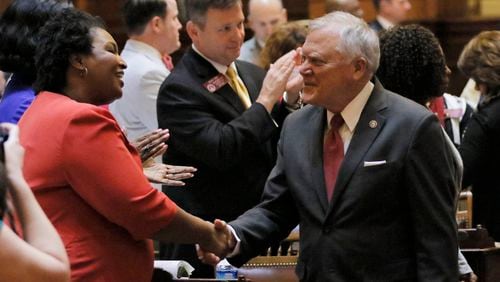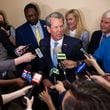One day, we may all remember Nathan Deal’s time in the Governor’s Mansion as halcyon days of easy political comity (certainly not comedy) and civility.
That day may come next January when the Legislature returns to Atlanta to confront or collaborate with a new governor sitting down the hall.
Deal is the last of Georgia’s old-school governors who will be remembered for quiet competence and not much more. (Quick, name one scandal involving George Busbee or Joe Frank Harris.)
You could argue (I certainly will) that Deal has as much or more in common with his predecessors — Democratic or Republican — as he does either of his prospective successors. In fact, all Deal’s immediate predecessors began as Democrats – conservative Democrats to be sure – but Democrats in the same party with liberal leviathans Tip O’Neill and Ted Kennedy.
And, until now, all Georgia’s governors have been white men born in the segregated South.
Each saw his fundamental duties as balancing the state budget, spreading the Atlanta boom and never, ever being confused with Lester Maddox or George Wallace.
All were pragmatists – a word that in our time has come to hold the same sting as “appeaser.” They were incrementalists - another bad word these days.
None was particularly ideological. Neither is Deal.
Without delving deeply into the pros and cons of the two candidates applying for his job, one thing seems clear: buckle up, we may be in for a bumpy ride.
Brian Kemp, the GOP candidate, would be the first governor since Rufus Bulloch in 1868 to have never been a member of both major parties. He expresses little or no empathy for Democrats and lacks a resume brimming with examples of crossing the aisle. He holds strong partisan positions and is unlikely to compromise them.
Stacey Abrams, his opponent, would arguably be the first real, national-style Democrat to govern Georgia in a long time, maybe ever. She also has clear positions and should not be expected to surrender them easily.
Both have clear agendas that could well disrupt the status quo, which hates nothing more than disruption.
Even Democrats may miss Nathan Deal.
State Rep. Mary Margaret Oliver, a longtime Democratic legislator, is a fan.
“I think he’s a decent man with a long career of public service,” said Oliver, who goes back decades to when she was a young lawyer and he was a young juvenile court judge. In those days, both were were Democrats.
“He was very much a professional, and he was a good judge,” she told me.
“As governor, I always felt like he had the same personality and same lawyerly interest in substance.”
Jason Carter, who lost to Deal in 2014, also has come to respect him, particularly his focus on important issues. “The main thing is when called upon to protect the state’s reputation when confronted with the worst extremes of the Republican Party, he has done it,” Carter told me.
Some describe Deal’s style as “no hits, no runs, no errors,” and express admiration for his ability to avoid self-inflicted wounds from rarely saying stupid or controversial things.
His quiet style has made him popular. In recent AJC polling, he was easily the state’s most-liked politician. Nearly half of Democrats approved of his performance (7 percent approved of Donald Trump), while 85 percent of Republicans said he was doing a good job. (With Republicans, Deal was even more popular than Trump.)
One of the Democrats polled surprised herself by liking a Republican. “You know, it’s funny,” Michelle Putnam told the AJC. “I’m a lesbian woman, and I didn’t think I’d say this. But there are a few times he stood up for his principles that I actually admire.”
Before this lovefest gets out of hand, let’s be clear, Deal governed as a conservative, in the traditional sense of the word. But his passion was not in excoriating Libtards, it was in returning Georgia to fiscal and economic health after the Great Recession. He focused on attracting new employers and holding on to old ones.
The clock may run out with him still campaigning to land Amazon’s new second headquarters, which would be the capstone to his career.
Brian Robinson, Deal’s spokesman in the early years, regards his former boss as anything but an ideologue. “At heart, he’s a conservative who puts governing above ideology,” said Robinson, now a public affairs consultant. “Look at how he handled the income tax cut this year. At first he was very cautious until he knew for sure we could cover revenue needs. Then he got onboard.”
Despite his conservative convictions, Deal rarely if ever led on divisive issues. Instead, he managed through them. He tended to lead on issues like judicial reform, which has rich bipartisan support.
To be sure, he was deeply opposed to expanding Medicaid, in part because of an old-fashioned dislike for the idea of extending the benefit to adults without children. He was opposed to any expansion of gambling, largely because he didn’t see enough economic upside to offset the moral peril.
He signed expansions of gun rights and tougher restrictions on abortions. But these bombs were lit in the GOP-dominated Legislature. Generally, he tried to defuse or delay such measures before allowing them to become law.
He irritated some social conservatives when he allowed Sunday liquor sales and expanded the use of medical marijuana. In perhaps his biggest break from his party’s right, he opposed and vetoed controversial religious freedom laws – measures that were seen as antibusiness and discriminatory.
And late last month, Deal suspended a spiteful attempt by the Legislature to continue a $40 million a year fuel tax on Delta Air Lines. The tax was extended after the airline ended discounts for NRA members following the February mass shooting at a Florida high school.
Supporters of both Abrams and Kemp pushed back at the suggestion that either would bring stormy clouds to the Gold Dome.
Ryan Mahoney, Kemp’s spokesman, took issue with the idea that his boss wouldn’t work with Democrats.
“As governor, Kemp is open to working with anyone - Republican or Democrat - to turn his plan into reality,” he said. “You can work in a bipartisan manner without compromising your principles.”
Priyanka Mantha, Abrams’ spokeswoman, said her candidate is committed to building consensus. “From Leader Abrams’ tenure working alongside Gov. Deal to Gov. Perdue’s relationship with a Democratic House, Georgia has a history of bipartisan governing that isn’t just a tradition – it’s a pragmatic necessity,” Mantha said.
In a recent interview with The Albany Herald, Deal oddly expressed no clear preference between Abrams and Kemp - even though he has officially endorsed Kemp.
“Hopefully, we’re going to see a continuation of the programs in the state that have worked,” he said, missing a chance to score a partisan point. “I think both candidates recognize how successful those reforms have been.”






